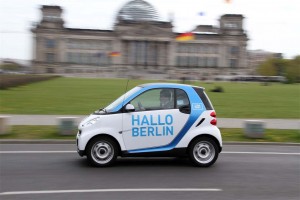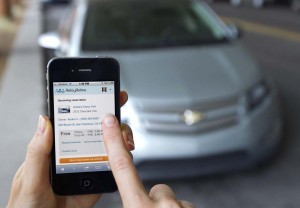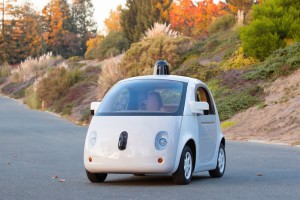The auto industry could take a big hit to sales and revenues as car-sharing services take hold around the world, warns a new study.
As many as 35 million people will use car-sharing services each month by the beginning of the next decade, forecasts the Boston Consulting Group. That will reduce global car sales by at least 550,000 vehicles by 2021, automakers taking a revenue hit of 7.4 billion euros, or $8.14 billion at the current exchange rate.
But the situation could get even more challenging later in the coming decade. As self-driving cars start to come to market in large numbers. “Autonomous vehicles will have a much greater impact on new-car sales than car-sharing will,” the study concludes.
Since the first cars took to the roads, the dominant model has been based on individual vehicle ownership. But that paradigm is shifting as alternatives become more widely available. These include car-sharing, essential short-term car rentals that are largely earmarked for urban environments. This is not likely to be “a true game-changer,” at least not initially, the study’s authors determine. Nor are ride-hailing services such as Uber and Lyft, which provide a more personalized alternative to hailing a taxi.
The real transformation comes as early as 2027, according to the Boston Consulting Group, or BCG, study. Autonomous vehicles that don’t even need a driver on board, “will change the game, erasing the distinction” between car-sharing and ride-sharing services. More importantly, they will offer “a significant edge in the total cost of ownership.”
Without the need to pay a driver – or the owner of a vehicle used in a ride-sharing service like Lyft – the price of using one of these alternatives could plunge to well below what it costs to own and operate a vehicle, BCG determines.
That, the study suggests, “should…make automotive OEMs consider reconceiving their mission, at least in part.” Automakers, contends the BCG study, “should experiment with providing mobility services and devise new business models accordingly.”
In fact, some already have. General Motors last month purchased the bankrupt Sidecar, while also investing $500 million in the more successful Lyft. Among other things, GM wants to use Lyft to expose customers of the service to the new, long-range Chevrolet Bolt battery-electric vehicle.
(For more on the changes at GM, Click Here.)
Ford has launched a variety of experimental car- and ride-sharing services in the U.S. and Europe, and other manufacturers, including Daimler AG, Volvo and Toyota, have launched experiments of their own.
Ford CEO Mark Fields recently noted that while car sales generate about $3 trillion annually worldwide, the broader mobility field already sees revenues of around $5 trillion – with carmakers taking in only a small fraction of that cash.
The BCG study focused on car-sharing services, such as North America’s Zipcar and Car2Go, as well as Europe’s Autolib and CarUnity. Most serve as short-term alternatives to traditional rental companies, with their own fleets of vehicles. But there are also peer-to-peer services, such as Turo – the recently renamed RelayRides – which help individual owners rent their own vehicles out.
(From yards to inches – how a new tech could radically improve GPS navigation. Click Here for more.)
Car-sharing services, BCG noted, are “taking hold” in most large urban areas – but both in developed and developing parts of the world. In Asia, the largest market today, there are 2.3 million users and 33,000 vehicles. Europe isn’t far behind, with 2.1 million customers and 31,000 vehicles available. North America has 1.5 million registered customers sharing 22,000 vehicles.
At the moment, the services are booking 2.5 billion minutes of usage annually, generating 650 million euros, or $715 million, in revenues annually. The number of users is expected to jump to 35 million, a roughly 600% increase, by 2021. Revenues will climb almost 12-fold, according to the study.
From a European standpoint, car-sharing is relatively cheap compared to taking a cab, about $5.45 for the typical ride compared to $20.80. But using a personal car is still cheaper, at $3.80 for using a personally owned vehicle for the average 4.5-mile trip.
Once autonomous vehicles become the norm, however, the study suggests prices will fall sharply for self-driving services, likely becoming even cheaper than owning and operating a vehicle for many people.
The situation will vary by market, the researchers note. Car-sharing will become steadily more popular in crowded European and Asian cities.
“The U.S. is different,” they concede, because of the country’s sprawl and the significant distances between major cities. Even in dense urban centers, such as New York, Boston and San Francisco, “the comparatively low total cost of vehicle ownership and the convenience of driving one’s own car will encourage many people in the U.S. to purchase a new car rather than forego ownership.”
(Volvo about to abandon the car key – and it isn’t alone. Click Here for more.)
That said, at least 5 million North Americans will be registered members of car-sharing services by 2021, says BCG, with 600,000 of them heavy users. And that’s enough to be felt by automakers in the future.




Aside from culture change one could interpret this to be symptoms of underlying systemic economic decline and instability in the USA due to many reasons not the least of which have been poor domestic, immigration , economic ,regulatory ,tax and trade policies for decades in Wash.D.C.
while the permanent political class and their money geyser benefactors continue to siphon wealth out of the middle class !